Civil Disobedience
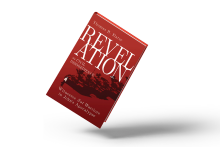
JOHN LEWIS died the week I read this book. No American alive in 2020 was a better witness to the courage of nonviolent civil disobedience than Lewis. Ironically, that same week “warriors” from the federal government descended, uninvited and unidentified, on Portland, Ore. Violence exploded. The Bible’s final book, Revelation, seems more relevant than ever.
Thomas B. Slater’s slim volume is not a typical commentary on the biblical book, analyzing all its chapters and decoding all its symbols. Instead, Slater focuses on the political situation of seven small house churches in Roman-dominated Asia Minor (now western Turkey), to whom John of Ephesus wrote (Revelation 2-3). These believers lived in cities where temples or shrines represented the imperial cult, and all subjects were expected to offer sacrifices to the current “divine” emperor.

The similarities here are not only due to the presence of death and violence, but high tensions between government and people. Here we’ve witnessed images of police exercising excessive force on protestors, extensive arrests of nonviolent demonstrators, and vile displays of militarization in neighborhood streets, much like in Baltimore, Compton, and other cities in the U.S.
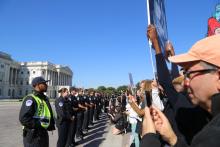
On Oct.15, faith leaders, human rights groups, refugees, and the former Assistant Secretary of State Anne C. Richard came together to hold a major action on Capitol Hill in protest of the current administration's 80 percent cut to the refugee admissions program.
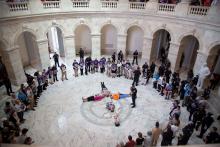
When the U.S. Capitol Police issued three warnings for us to disperse, most of those gathered stepped back behind the police line, but five stepped forward and laid down in the shape of a cross in the center of the rotunda. A cross of human bodies. Dozens more formed a eucharistic circle around this cross.

Dr. Scott Warren is defending himself against three felony charges including conspiracy to transport and harbor migrants — charges that could add up to 20 years in prison.
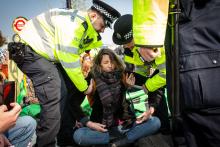
Christians are stepping up to show their leadership on climate action in London this week during the Extinction Rebellion protests that have occupied four key positions in central London over the past week. The Extinction Rebellion has three stated demands of the United Kingdom government: declare a climate and ecological emergency, reduce greenhouse gas emissions to net zero by 2015, and "create and be led by the decisions of a Citizens’ Assembly on climate and ecological justice.” In the collective nonviolent efforts to achieve these goals, over 950 have been arrested.
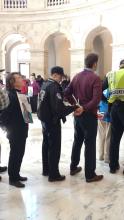
Earlier this week, I participated in civil disobedience for the first time. Forty Catholic sisters, priests, and other lay Catholic advocates were arrested in the rotunda of the Russell Senate Office Building in solidarity with young undocumented “Dreamers.” These immigrants, brought to this country as children, are living in fear of deportation after the Trump administration ended an Obama-era program that offered them protection. Congress now has to find a solution. About a third of all House members, including Speaker Paul Ryan, and a quarter of senators are Catholic. More than a 100 Catholics, including Dreamers, showed up for a rally and press conference outside the Senate building, urging lawmakers to act.

YOU MAY REMEMBER the images of disabilities advocates arrested last year, some handcuffed in their wheelchairs, outside Senate Majority Leader Mitch McConnell’s office. Or the pastors arrested holding signs that said: “Love Thy Neighbor.” Or the waves of clergy and faith-leader arrests in Ferguson and Standing Rock, and those advocating for Dreamers and opposing tax cuts for the rich.
Maybe you heard about pastor Jarrod McKenna and Delroy Bergsma in Perth, Australia, who suspended themselves four stories above the office of Foreign Minister Julie Bishop to persuade the Australian government to act for refugees held on Manus Island without supplies. Or last year’s witness on the steps of the Supreme Court where 18 people of faith were arrested protesting the death penalty. Or the August gathering in Charlottesville, Va., where hundreds of courageous pastors, clergy, and other activists confronted the hatred of torch-bearing neo-Nazis and white supremacists.
These events aren’t about going to jail. They are about countering hatred with nonviolent love.
Civil disobedience is holy work. Gandhi called nonviolent civil disobedience “our sacred duty.” There are many ways to nonviolently resist injustice: Boycotts. Divestment. Writing op-eds. Petitions. Lobbying. Prayer vigils. Groundswell campaigns. Picket lines. Strikes. Die-ins. Sit-ins. Lock-downs. Distributing flyers on street corners. (Famously, the late political scientist Gene Sharp listed 198 methods of nonviolent direct action.)
Going to jail isn’t the only way to resist evil. But it is one way. And a very effective way, with a rich tradition for Christians. Though questions of privilege arise when it comes to risking arrest, what also surfaces is that some people have nothing to lose “but their chains,” as the chant goes. Many marginalized people have found civil disobedience to be a way to rage collectively against injustice and to stop business as usual.

Power always produces accommodation, and already Trump is being normalized by the media and political world — with the elites adjusting to the new situation of power as they always do Celebrity has replaced leadership, chest pumping has replaced unifying, tweeting has replaced press conferences and international policymaking, and profiteering looks to become a presidential business. The president-elect’s denials of facts — like intelligence community reports of Russian intervention in an American election — are breathtaking.
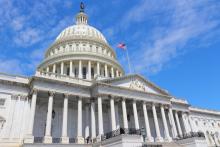
In demonstrations aimed at getting money out of politics, 85 people — many elderly — were arrested April 12 outside the Capitol, reports DCist. The protests are part of a weeklong series of demonstrations that seek to “make history and save our democracy,” according to the Democracy Spring website, which castigates “billionaires and big money interests” and advocates campaign finance reform.
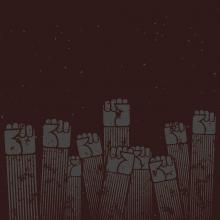
In today’s political climate we’re witnessing plenty of protesting — there is indeed much to protest. But some Christians, particularly in evangelical circles, believe protesting is sinful, that it’s only something that young, uneducated, unemployed, liberal fools do just for the sake of causing trouble.

FOR IMMEDIATE RELEASE
Contact: Michael Mershon, Director of Advocacy and Communications
Email: mmershon@sojo.net
Phone: 202-745-4654
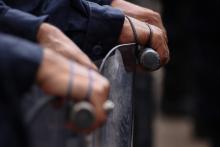
Close to 200 Japanese protesters gathered in Okinawa to stop construction trucks from entering Camp Schwab, a U.S. base, after the Ministry of Land overruled the local governor’s decision to revoke permission for construction plans. They criticized the "mainland-centric" Japanese government of compromising the environmental, health, and safety interests of the islanders.
Riot police poured out of buses at 6 a.m., outnumbering protesters four-to-one, and in less than an hour had cleared way for the construction vehicles.
Local officials have objected to the construction of the new coastal base, which will landfill 160 acres of Oura Bay and require a 205 hectare construction plan to develop a military runway.
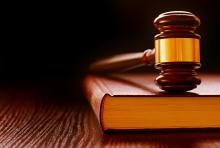
Despite threats from some conservative Christian dissenters, civil disobedience may turn out to be an irrelevant response to gay marriage.
To understand why, we have to think seriously about what civil disobedience really is.
Here’s a good definition: If a government mandates what religious people believe God forbids, or forbids what religious people believe God mandates, civil disobedience may be required.
In the first case civil disobedience involves the refusal to do what government commands, and in the second case it involves the continued practice of an act that government has banned.
Could this apply to the new legalization of gay marriage nationwide?

We call it Holy Week. But it was a terrible week.
His trial reeked of injustice. His own disciple sold him out for a few pieces of silver, betrayed him with a kiss … and hung himself.
As he was arrested, one of his closest friends disregarded all his teaching on love, pulled out a knife, and cut a guy’s ear off. (Jesus called him out … and healed the other guy). A lot of the stuff that happened that first holy week was pretty unholy.
Once arrested, he was passed back and forth between politicians and bureaucrats. There was Caiaphas the priest, the Sanhedrin council, Pontius Pilate, the crowd — everyone seemed to want him dead, but no one wanted blood on their hands. Even Pilate washed his clean.
They had all kinds of accusations. Insurrection. Inciting a riot. Conspiracy. Terrorism (plotting to destroy the temple). Blasphemy.
But all he did was love. And heal. And give people hope.
Despite any substantial evidence, witnesses, or signs of any crime committed, he was pronounced guilty and sentenced to die.
As he awaited his fate, he was bullied, interrogated, harassed, tortured, beaten to a pulp. The authorities humiliated him and stripped him naked. They mocked the claims of his divinity, ramming a crown of thorns onto his head and wrapping him in a royal purple robe as they laughed.
And so it went. This man who many believe was the holy one that the prophets spoke of, the long-awaited Messiah, God incarnate, love with skin on— was executed, brutally. He died with his body convulsing as his lungs collapsed, with vultures swarming overhead, hoping to clean up after the execution. There is nothing more evil than what happened that “Good” Friday.
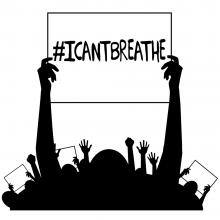
Our nation stands at a crossroads moment as the simmering crisis around policing and our justice system reaches a boiling point. Recent cases of police violence in Ferguson, Cleveland, and now Staten Island have stirred an awakening around what is increasingly understood as a pervasive and pernicious problem in America in which black lives are too often treated differently when it comes to police accountability and criminal justice.
Last week, I had the privilege of participating in a retreat with other faith leaders convened by Sojourners to learn about and make common cause with the ongoing efforts to seek justice in the tragic death of Michael Brown Jr. We spent a day talking to local faith leaders and young activists. We visited the memorial site in Ferguson where Brown was tragically killed and the streets where 120-plus days of protest have ensued. While it was heart-wrenching to stand and pray at the site where Brown was killed, I left the two days filled with a resilient sense of hope based on our conversations and interactions with a cross section of young people, most in their early to mid-20s, who embody modern-day freedom fighters. I hope we as a nation can listen to their voices and come to know their stories as we seek answers around what our response should be.
Young activists at the center of the protest movement in Ferguson are refusing to accept cosmetic change or symbolic commitments; instead they are fighting to transform their community and our nation so that neither punishment nor privilege will be systemically or viciously tied to the color of our skin. In the process, these young activists are picking up the broken pieces of the civil rights struggle. Their courage, willingness to sacrifice, and bold vision gave me a great deal of hope for what America can be.
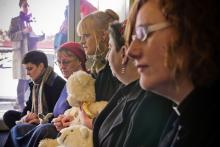
“We will not only win victory for ourselves; we will appeal to your heart and conscience that we will win you in the process and our victory will be a double victory.” – Martin Luther King, Jr.
Four years ago I was working a corporate job for a national AFL team. It was well paid. I had great opportunities. Life was good. If you had told me that I was going to become a Christian, I would have laughed in your face. If you had gone on to say I would leave my well-paid job to spend my days running a Welcome Centre for refugees while working side jobs to make ends meet, I would have questioned your mental health. If you had added that I would be arrested with church leaders and a rabbi while continuing Martin Luther King’s work, it would have certified to me that you were crazy.
On Monday I walked into Austrailian MP Jamie Briggs' office to be arrested with seven Christian leaders and a rabbi. It sounds like the start of a joke. (My life is teaching me God has a great sense of humor.)
Why were we arrested? There are 983 children and their families currently in Australia’s detention centers.
These children are kids just like our own, with their made-up games, whispered jokes, and giggles. Their families dream of a future of safety. Our incoming Governor of South Australia, Hieu Van Le, arrived by boat in Darwin seeking refuge 36 years ago, with “nothing but a suitcase filled with invisible dreams. A dream to live in a peaceful, safe and free country and to live a meaningful and fulfilling life.” In the past, Australia has been the kind of nation that grants dreams like this – why not for the 983 future Hieu Van Le’s and their families in detention?
A world away and so many years later, how is Martin Luther King’s freedom movement related to the current plight of asylum seekers in Australia? Well, the links are stronger than you think.

Editor's Note: The following story originally appeared HERE in The Australian Financial Review.
Jarrod McKenna is in trouble. It's not that the dreadlocked Christian activist is at risk of being arrested, as he has been at several anti-war and anti-coal protests. Rather, he has let five-year-old Congolese refugee Zephanta Baganizi eat the leftovers of our very late lunch, shortly before dinner time.
"Have you asked your mum if it's OK?" McKenna asks "Zopho," who is gazing at several pieces of bolani, a vegan flat-bread meal from Afghanistan. Transfixed by the food, Zopho doesn't respond.
"Just a small piece, then."
Zopho grabs the biggest piece. He runs off to his family's apartment, mouth overflowing with fried bread and vegetable filling.
"I'm in trouble," McKenna says.
The interaction between Australian, Congolese and Afghan food, people and culture is not uncommon at a large block at the end of Dudley Street in the outer Perth suburb of Midland.
It is the location of First Home Project; a former methamphetamine lab transformed into three apartments that provide medium-term accommodation at below-market rates for refugees transitioning into their new Australian lives.
This President’s Day, about 20 church leaders, sympathizers, and undocumented immigrants were arrested in front of the White House as part of an act of civil disobedience to protest the nearly 2 million people who have been deported under President Obama.
The core group and about 40 supporters gathered around 1 p.m. on Monday afternoon in Lafayette Park in front of the White House. They held signs that said, “Praying for Relief” and “#Not1moredeportation,” and sang hymns in between short megaphoned speeches that told personal stories. They called for immigration reform. “Not one more, not one more,” they chanted together in both English and Spanish.
The event was organized by Bishop Minerva G. Carcaño of the United Methodist Church, who was the first Hispanic woman to be elected to her position.